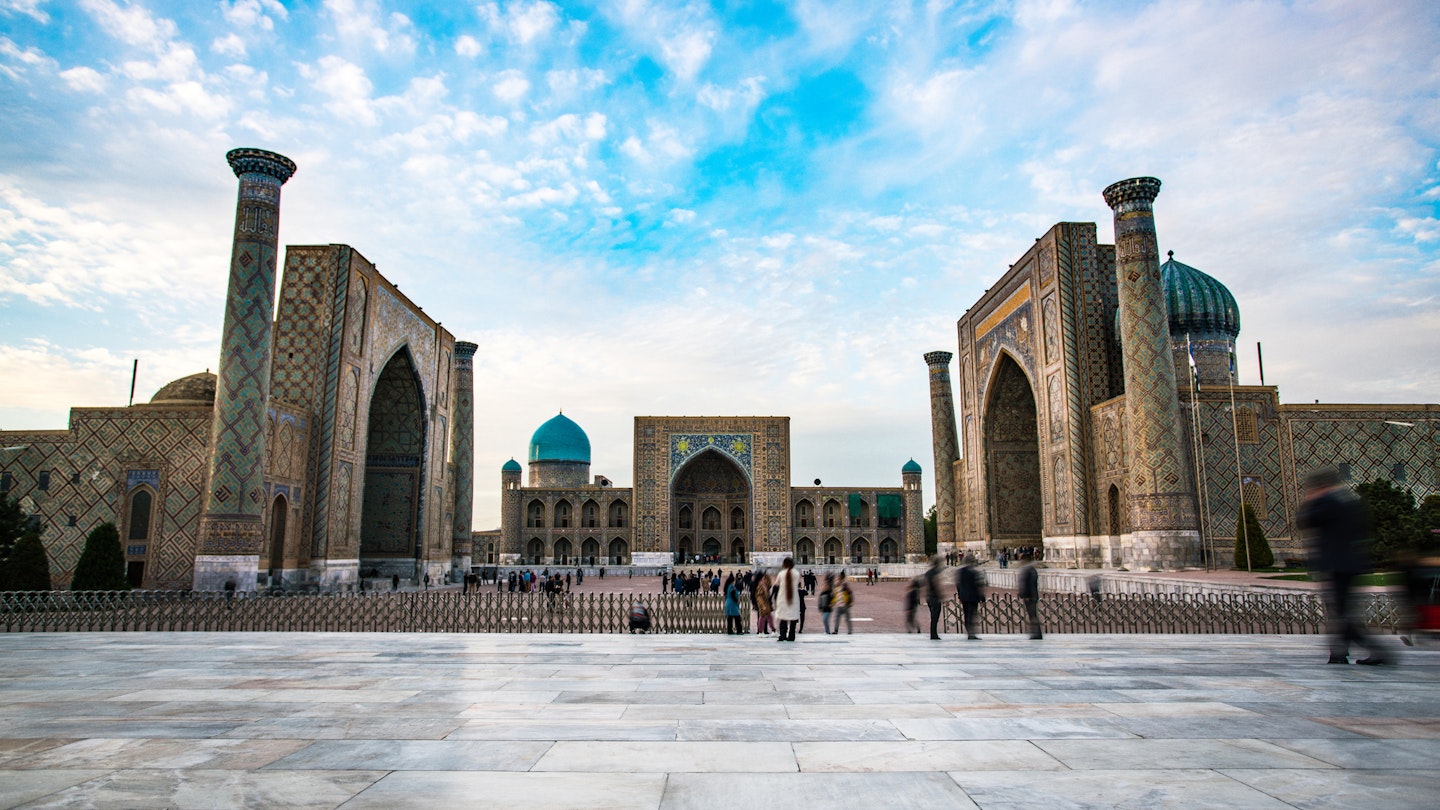There’s good news for budget travelers: Uzbekistan is one of Asia’s most affordable destinations.
Whether you are backpacking around Uzbekistan on a shoestring or looking to travel in a little more comfort, you’ll find that accommodations, meals, and public transportation offer great value for money.
This means you can explore the highlights of the Silk Road, hike in national parks, and see quirky Soviet-era architecture without burning through your travel budget. Try these tips for keeping costs down while exploring Uzbekistan’s ancient and modern wonders.
A guide to daily costs
- Dorm bed: US$8–10
- Basic room for two: US$20–40
- Tashkent Metro ticket: US$0.15
- High-speed train ticket from Tashkent to Samarkand: US$9
- Coffee: US$1–2
- Beer: US$1–2
- Snack: US$0.50–1
- Dinner for two: US$5–10
Average daily cost: US$25–40
1. Travel to Uzbekistan in winter
To shrink the cost of travel in Uzbekistan, go between November and March. You’ll often have blue skies and sunshine, while package tour groups avoid Uzbekistan in winter. Consequently, domestic and international flight prices are lower, and hotel rates drop as well. All the major attractions in Samarkand, Bukhara, and Khiva are open year-round, and snowfall is rare away from the mountains.
2. Look at flights to regional airports
The majority of international flights to Uzbekistan arrive in Tashkent, the busy capital. However, you can save money by booking indirect flights to smaller regional airports. Turkish Airlines flies via Istanbul to Samarkand, Bukhara, Namangan, and Urgench (the airport closest to Khiva). Moreover, Samarkand is served by several budget airlines, including flyDubai from Dubai and Wizz Air from Abu Dhabi.
3. Don’t pre-book airport taxis in Tashkent
Hotels in Uzbekistan are notorious for charging a substantial mark-up for airport transfers. Fortunately, there are cheaper ways to get to town from the airport. At Tashkent International Airport, you can pay for your taxi at the official taxi desk next to the baggage carousel. Rates are fixed based on distance, and you can pay in cash or by card.
4. Navigate Tashkent by metro
Most hotels and tourist attractions in Tashkent are within walking distance of a metro station, and metro tickets cost just US$0.15 per journey. This is a budget-friendly way to get around while also experiencing the city’s unique metro stations, which have been designed by various artists. The Tashkent Metro is a tourist attraction in its own right.
5. Pre-book train tickets online
When you’re traveling on a budget in Uzbekistan, train travel is an excellent option. The high-speed Afrosiyob service is the fastest way to get from Tashkent to Samarkand, Navoi, and Bukhara. Pre-booking tickets online can save you money on agents’ fees; however, booking well in advance is essential as standard-class tickets sell out quickly.
6. Use a shared taxi to travel between cities
If you’re backpacking in Uzbekistan on a tight budget, local shared taxis can take you almost anywhere for a reasonable price. Each town has taxi stands where you can wait for the vehicle to fill up before departing. Moreover, drivers are often willing to negotiate fares, making it easier to stay within your budget.
7. Stay in locally-owned hotels
While many hotels are run by international chains, opting for locally-owned establishments can significantly help you save on accommodation. Moreover, you can enjoy a more authentic experience and contribute to the local economy by choosing Uzbek brands.
8. Book a bed instead of a room
For budget travelers, many smaller hotels and guesthouses offer rooms that function like hostel dorms, accommodating four to six people. This setup allows you to pay only for your bed while sharing a bathroom with other guests, keeping your costs low.
9. Ski at Amirsoy, but don’t stay
Amirsoy in Tashkent Region is Central Asia’s premier winter sports resort. While lift passes and equipment rentals are affordable, accommodation at the resort can be costly. Consequently, budget travelers should consider staying nearby and taking a taxi to Amirsoy for day trips on the slopes.
10. Hire city guides by the day
If you are traveling in Uzbekistan, consider hiring a local guide for a day. This can enhance your experience at key sites like Samarkand and Bukhara without the cost of a full tour. Connecting directly with local guides can often yield better rates.
11. Focus your sightseeing on religious sites
Uzbekistan boasts a wealth of Islamic mosques, shrines, and madrassas, many of which do not charge entry fees. However, be respectful of local customs and etiquette while visiting these places of worship, such as removing shoes before entering.
12. See Khiva from the outside
Khiva’s ancient walled city, a UNESCO World Heritage Site, is a must-see. However, you only have to pay to enter museums, palaces, and mosques within the Ichon-Qala. Wandering through its streets is free and allows for stunning views of the city’s rich architecture.
13. Eat in traditional chaikhanas
For budget dining, look for chaikhanas—casual teahouses that serve inexpensive local dishes. These eateries often feature local favorites such as kebabs, noodle soup, and stuffed pastries, making them both affordable and delicious.
14. Drink locally produced alcohol instead of imported brands
To save on beverages, opt for locally made brands of beer and wine, which are more cost-effective than imported options. Additionally, you’ll find a variety of local vodkas and cognacs, which can be purchased more affordably from supermarkets.
15. Pick up a local SIM card
To avoid high roaming charges, consider purchasing a local SIM card for your phone. Major operators like Ucell, Mobiuz, and Beeline offer competitive rates, and having a local number can also facilitate using services like the Yandex taxi app.
16. Purchase a refillable filter bottle
Since drinking tap water in Uzbekistan is not advisable, invest in a filter bottle before traveling. This allows you to refill from any water source without health concerns while minimizing your environmental impact.





